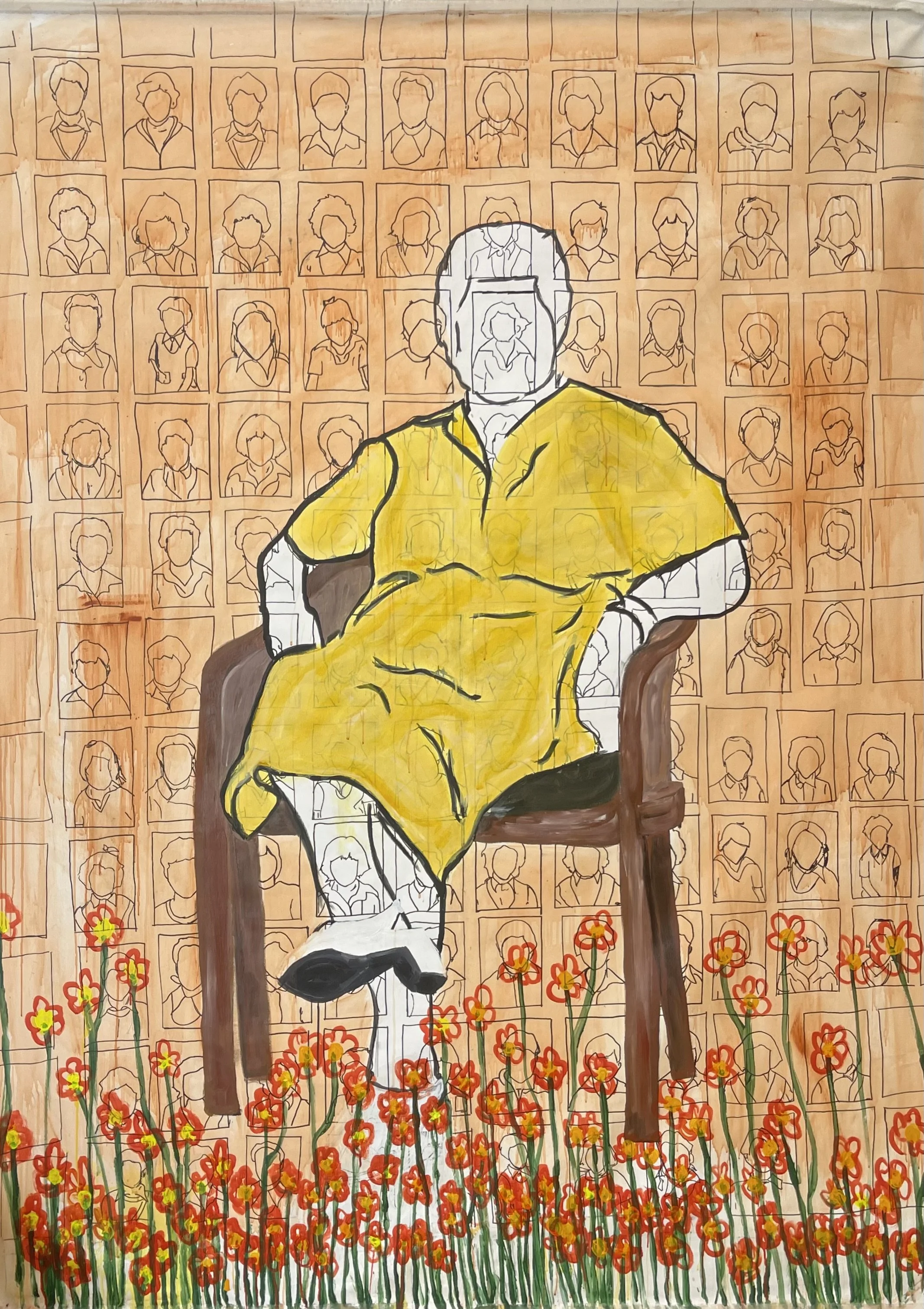The Artwork tells the story of Elizabeth Hanna Nasser, "the pioneer of social work in Jerusalem," who embodies the spirit of perseverance and dedication to serving her community. It is a story filled with courage and commitment. Her journey began by using her available resources to create educational opportunities for underprivileged children in Jerusalem by transforming her home into an educational space. Elizabeth proved that social work can start at home and grow to become an integral part of the social fabric.
Through "Rawdat El-Zuhur", an educational community emerged, initially empowering girls and later boys, providing them with opportunities to learn life skills in various forms. This home turned into a school from which students graduated equipped with the necessary skills to face life's challenges and achieve their aspirations.
Elizabeth's role extended beyond that of a teacher and school principal; she was also a social leader and influential figure in the community. Her courage was manifested in speaking the truth and defending the weak and needy. Through her challenges and successes, she became a living example of dedication and inspiration for future generations.
Thanks to her legacy, many young men and women enjoy new opportunities to achieve their dreams and develop their skills, thus continuing Elizabeth Hanna Nasser's legacy of contributing positively to building a better society in Jerusalem and Palestine.
The work drew inspiration from the archive, using images of students as the flowers of Elizabeth Hanna Nasser's garden or "Ms. Nasser" (as the students used to call her), based on Elizabeth's idea that "The home is the garden, and the students are its flowers."
References:
Book "Jerusalemites Who Made History," by Aziz Mahmoud Al-Asa and Dr. Imad Afif Al-Khatib, 2018.
Report "Elizabeth Nasser, Pioneer of Social Work in Jerusalem," interview with Samia Khoury, niece of Elizabeth Nasser, on Al-Ghad News Channel, 2019.
Campaign "We Are Palestinian Women," during March, celebrating Palestinian and Jerusalemite women, Yabus Cultural Center, 2019.
"Rawdat El-Zuhur School" collection in the Palestinian Museum archive.
Flowers Of the Garden (Zuhur El-Rawda) (Elizabeth)
زهور الروضه (اليزابيث)
2024
اكريليك على كانفس
200*160 سم
Acrylic on canvas
200X160 cm
استوحي العمل من صور مجوعة "مدرسة روضة الزهور" في ارشيف المتحف الفسطيني.
The Artwork Was inspired by Pictures from the “Rawdat EL-Zuhur School” collection in The Palestinian Museum Archives.
يحاكي العمل قصة السيدة إليزابيث حنا ناصر "رائدة العمل الاجتماعي في القدس" التي تنم عن روح المثابرة والإخلاص لخدمة مجتمعها، وهي قصة تحمل في طياتها الكثير من الشجاعة والتفاني. بدأت رحلتها ببساطة، حيث استخدمت مواردها المتاحة لخلق فرص تعليمية للأطفال المحرومين في القدس. بتحويل بيتها إلى مركز تعليمي. أثبتت إليزابيث أن العمل الاجتماعي يمكن أن يبدأ من البيت وينمو ليصبح جزءًا لا يتجزأ من البنية الاجتماعية
من خلال جمعيتها "روضة الزهور"، نشأ مجتمع تعليمي يُمكّن الفتيات بالأساس ولاحقا الفتيان المشردين والمتسولين، ويقدم لهم فرصًا لتعلم مهارات الحياة بشتى أشكالها. تحول هذا البيت إلى مدرسة يخرج منها الطلاب والطالبات الذين يمتلكون الآن المهارات اللازمة لمواجهة تحديات الحياة وتحقيق طموحاتهم
إليزابيث لم تقتصر على دورها كمعلمة ومديرة مدرسة، بل كانت أيضًا رائدة اجتماعية وشخصية مؤثرة في المجتمع. تمثلت شجاعتها في التعبير عن الحقيقة وفي الدفاع عن الضعفاء والمحتاجين. ومن خلال تحدياتها ونجاحاتها، أصبحت مثالًا حيًا للتفاني والإلهام للأجيال الجديدة.
بفضل إرثها، يتمتع العديد من الشباب والشابات بفرص جديدة لتحقيق أحلامهم وتطوير مهاراتهم، وبهذا يستمر إرث إليزابيث حنا ناصر في المساهمة بشكل إيجابي في بناء مجتمع أفضل في القدس وفلسطين
استوحي العمل من الارشيف مستخدما صور الطلاب والطالبات كزهور روضة اليزابيث حنا ناصر او "مس ناصر" (كما كان الطالبات يلقبونها) معتمدا على فكرة اليزابيث "البيت هو الروضه والطالبات زهراتها"
مراجع
كتاب "مقدسيون صنعوا التاريخ"، أ. عزيز محمود العصا و أ.د. عماد عفيف الخطيب، 2018. / تقرير "اليزابيث ناصر، رائدة العمل الاجتماعي في القدس"، مقابلة مع سامية خوري ابنة شقيق اليزابيث ناصر، قناة الغد الاخبارية التنويرية، 2019. / حملة "نحن نساء فلسطينيات"، خلال شهر اذار، احتفاء واحتفال في المرأة الفلسطينية والمقدسية، مركز يبوس الثقافي، 2019. / مجموعة "مدرسة روضة الزهور" في أرشيف المتحف الفلسطيني.
